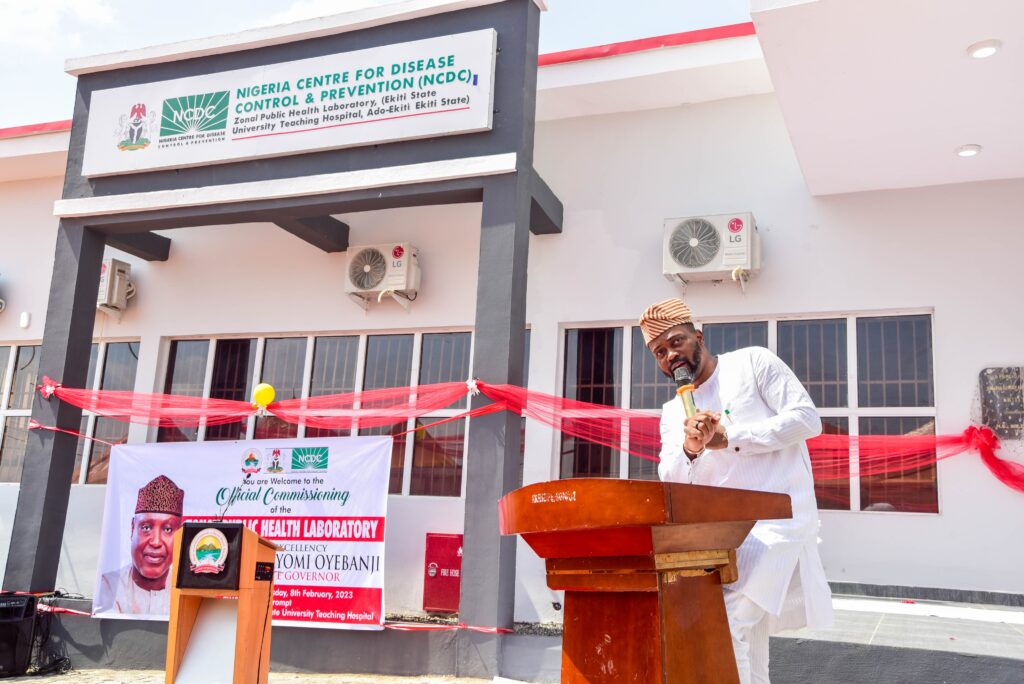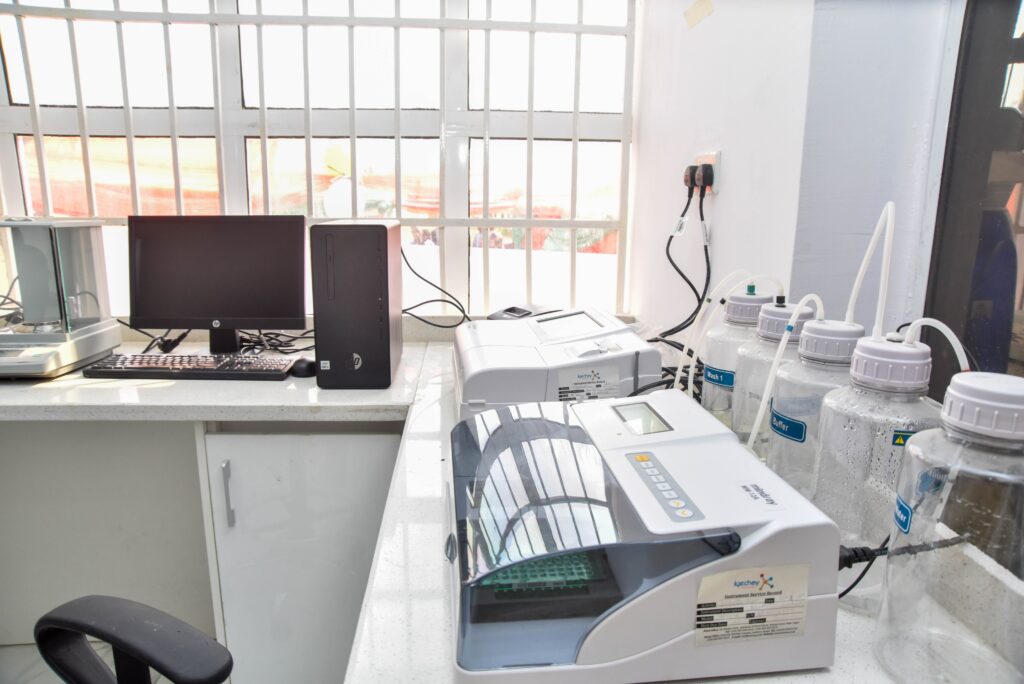On Wednesday, February 8, 2023, Ekiti State Governor, Biodun Abayomi Oyebanji, commissioned the Zonal Reference Laboratory (ZRL), a standard public health diagnostic centre donated by the Nigeria Centre for Disease Control & Prevention (NCDC).
The diagnostic centre is the first ZRL in Nigeria, and it was built with funds sourced from the World Bank’s Pandemic Emergency Financing (PEF) facility via the Nigeria COVID-19 Preparedness and Response Project (CoPREP), after a group of Executive Directors sitting on the board of the World Bank had approved a grant of $14.28m on August 6, 2020.
Favoured Among Its Peers in SW Zone
The developmental objective of the CoPREP is “to prevent, detect, and respond to the threat posed by COVID-19 at the State level,” and one of the three cores supported by the PEF facility is the creation of laboratories to increase the diagnostic capacity at the state level. And to do this, there was a need to choose six sub-nationals from the six geopolitical zones (GPZs) in the country to serve as hubs for the establishment of six regional laboratories.
Ekiti was favoured, among the six states in the Southwestern (SW) region, to house the regional laboratory. As stated by the NCDC, the nation’s public health institute “is mandated by law to develop a network of highly specialised reference laboratories to contribute to national health security” and in turn improve the nation’s testing capacity for Covid-19 and other infectious diseases.
JEE’s Assessment Necessitated the Establishment of Regional Labs
A report by public health experts on BROOKINGS (a non-profit public policy organization in Washington, DC) revealed that in 2017, during the WHO’s Joint External Evaluation (JEE) of International Health Regulation (IHR) core capacities (an independent, collaborative multisectoral effort to assess a country’s capacity to prevent, detect and respond to public health risks), Nigeria scored poorly in prevention and response categories, but scored better in the assessment category for detection.
The country had an average score of 2.6 across 13 performance indicators in the detection category. It revealed that Nigeria has developed some valuable capabilities to detect new public health emergencies and risks through “real-time surveillance and laboratory capabilities” to diagnose diseases, but the report further noted that the “sustainability of these capabilities” is somewhat very doubtful. This, alone, screams for the establishment of regional labs to further strengthen the detection capacity of the nation.
During the 2020 pandemic, Ekiti was one of the first five states that recorded outbreaks in Nigeria. Public Health Emergency Operation Centres (PHEOCs) at the national and sub-national levels were activated to respond to these outbreaks. A series of meetings were conducted by the Technical Working Group (TWG) to curb the outbreak.
Going by the JEE’s assessment and conclusion on detection, the country had a low testing rate, and this is because tests can only be conducted for just 2,500 samples per day. To corroborate this, one cannot overlook the issue of limited diagnostic centres, human resources, and testing kits.
According to a statement by NCDC, one of the few lessons learned from the “global pandemic and its impact on Nigeria,” was to establish laboratories across the 6 GPZs and they are all “at various stages of completion.” Ekiti has now moved quickly to commission her reference lab.
Turnaround Time for Lab Diagnosis to Improve
At the commissioning ceremony of the ZRL, Governor Oyebanji stated that “outbreak of diseases cannot be declared without a valid laboratory confirmation.” By case categorization, a case is classified as suspected when a laboratory diagnosis hasn’t been conducted on samples collected for analysis. But when a laboratory test on a suspected Yellow Fever case confirms the case as positive, an outbreak is declared.
The Governor, who recently celebrated his 100 days in office, further said that despite the NCDC’s provision of National Reference Laboratory (NRL) as an avenue for diagnosis of diseases in different categories, there has been “delay in transportation, and other factors have left the extension of turnaround time of results and this usually leads to delay in confirming and responding to outbreaks.”
Honourable Commissioner of Health (HCH), Dr Oyebanji Filani in his usual candour echoed the words of the governor and also revealed that “at the very minimum, we are cutting down the turnaround time by days.” The HCH also revealed that the ZRL will serve other states (Lagos, Ogun, Ondo, Osun and Oyo) in the Southwest region and even neighbouring Kwara. He noted that the ZRL will act as a cog in wheel for the tertiary health institutions in the State, with Ekiti State University Teaching Hospital (EKSUTH), Federal Teaching Hospital (FETHI) and ABUAD Multisystem Hospital benefiting in a broader view and perspective. This creates an enabling environment for an effective health system.

A Masterpiece of Scientific Edifice to Behold and Notice
Ekiti ZRL is a single-storeyed building that has a space for administrative affairs; its reception space is the first point of entry into the edifice, above this floor, there is a Conference Room for meetings, a General Staff Office to accommodate the lab scientists and other member of staff and also a Call Room to get the workers rejuvenated. The technical spaces boast a Sample Preparation Room, General Laboratory, Serology Laboratory, and Polymerase Chain Reaction (PCR) Suite to name a few. Take a critical look at the whole set-up and you will see that the lab is well equipped with world-class diagnostic equipment and there is nothing left to add to the machinery, but proper maintenance.

A Public Health-secured LGA Gives the State a Balance
With this standard diagnostic centre, the surveillance of disease at the State and Local Government Area (LGA) levels by the Rapid Response Teams (RRT) – which comprises Disease Surveillance & Notification Officers, Environmental Health Officers, Veterinary Officers, and Lab Focal Persons – is expected to improve the Emergency Preparedness and Response (EPR) to public health emergencies in Ekiti. The RRT operates using a one-health approach. Regular sensitization on disease surveillance activities has made the State RRT remain the best in disease surveillance across the federation. In April 2022, the State team was awarded by the NCDC as the Best Performing State in Disease Surveillance in Nigeria. It’s an award the State has won three times in the last four editions. In all of this, the role of field volunteers, who are majorly known as Community Informants cannot be overemphasized, as they play a huge role in disease detection at the community level. The bedrock of Universal Health Coverage (UHC) is the community. Most of the cases are usually picked by community informants. It is also worth noting that across the 16 LGAs, EOC was established and has since been functional.
Optimal Vaccination Coverage Has been Prioritized
COVID-19 vaccination was introduced in 2021, and as of the 10th of February, the proportion of fully vaccinated clients in Nigeria stands at 58.2%, while the proportion of fully vaccinated in Ekiti stands at 79%. The State occupies the 10th position on the vaccination coverage log, as documented by the National Primary Healthcare Development Agency (NPHCDA). Ekiti has remained one of the states with high vaccination coverage. Records from the Routine Immunization (RI) and Supplemental Immunization Activities (SIA) history show that the vaccination coverage is at an optimal level. In the last five months, SIA for measles and polio vaccines have been conducted in November, December 2022, and January 2023.
GHSA 2024 Is A Key Thing; Ekiti, Nigeria, and the World Know This
The Global Health Security Agenda (GHSA), an effort by over 70 countries in the world to strengthen health security, in 2018, saw a valuable commitment by all its members to have a strategic framework, termed GHSA 2024. The GHSA 2024 positions these countries “to develop the leadership, technical, knowledge, and collaborative foundation to sustain health security in the long term” and thereby encourage a healthier and sustainable universe.
Exactly three years after the global pandemic, Ekiti has recorded over 2400 confirmed cases of COVID-19, mortality is 28 and the Case Fatality Rate (CFR) stands at just 1.2 percent, but now there is a regional public health reference laboratory to further strengthen the public health security of the state and even other SW states in its GPZ. It is such an exciting time for the State’s health system.












